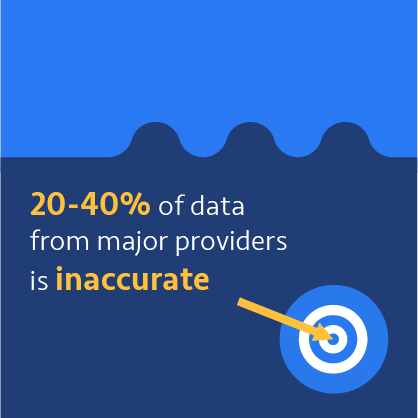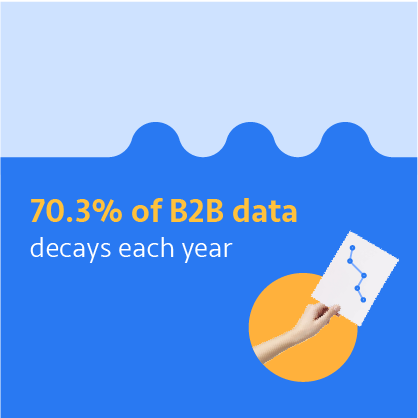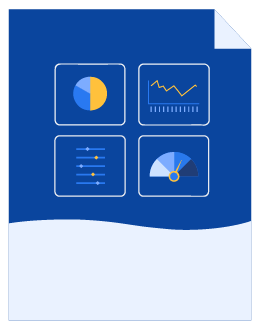Since it’s tedious and difficult to collect high-quality B2B data internally, many organizations turn to contact database providers.
Choosing the right B2B contact data provider is important because it costs less to prevent bad data from entering your database than it does to fix an inaccurate database. Having accurate data also saves your sales team time from validating contacts, giving them more time to make important calls.
As you’re narrowing down which data provider to pick, these are the 5 factors you need consider during evaluation:
- Data accuracy
- Data precision
- Database completion
- Data provider’s service model
- Data provider’s level of support
Keep reading to learn more about how a high-quality data provider leads to having a clean and useful database for both your sales and marketing teams.
1. Data accuracy
Data accuracy measures whether or not your data is error-free. Some of these data errors include:
- Duplicate records
- Data entered incorrectly
- Misspellings
- Outdated information
- Incorrectly or inconsistently formatted data
It’s important to evaluate data accuracy because using bad data means you risk wasting money and your sales team’s time. Our recent post on the risks of bad data outlines how using an inaccurate database is exponentially more expensive than simply preventing bad data from entering your prospect list.
Many organizations looking to build out a contact database often overlook the importance of accurate data, so they turn to major data vendors. Most large data providers state they have accuracy over 90% unless proven otherwise. This means that these data vendors can continue to advertise that they have a high accuracy rate as long as no one challenges them.
Many clients come to us to verify, clean, and augment lists purchased from other major providers.
We’ve performed random sample tests on 10,000 records pulled from some of the most premier contact databases and discovered error rates drastically higher than what they claim: between 20-40% inaccurate.

This is because the majority of major data providers are more focused on adding high volumes of data than maintaining its validity. If you don’t take accuracy into account when evaluating providers, you are susceptible to wasting time and money.
To outline just how costly bad data is, let’s consider a company that has 35,000 records in their contact database. If 30% of their database is inaccurate, that’s 10,500 bad records. Using the 1-10-100 rule, we can estimate it would cost the organization $100 per bad contact if they continue to use inaccurate data. The total monetary loss for this organization would amount to over $1M in lost revenue every year.

Data decay is a main cause of data inaccuracies. B2B data decays at a 70.3% rate annually; this number can be higher for different industries.
To ensure your data accuracy, you need to consider the age of the data you purchase and make sure the contact database contains little to no decayed data.
For example, EBQ evaluates our own database quarterly. We recommend analyzing your own database at least semi-annually and deleting any old contacts with hard bounces.
To ensure we’re consistently providing accurate data to our customers, our data department uses a mix of proprietary automation and manual processes. After the data is collected and verified through our internal tools, our Data Specialists cross-verify each data point by hand to ensure accuracy.
If you’re struggling with evaluating the accuracy of your own database, EBQ offers a data scrubbing service to help you verify and clean your prospect data.

Beginner’s Guide to B2B Sales Data Management
Learn everything you need to know about collecting prospect data and maintaining the health of your database.
2. Data precision
Unlike data accuracy, data precision refers to if the data is relevant to your total addressable market (TAM). This is important because you need to ensure there’s a balance between contact volume and relevance to your sales and marketing teams.
However, most major data providers can only provide your business with standard contact information—allowing little to no customization in the data points you can collect.
Most of the time, this standard contact information does not provide enough context to help the sales team differentiate a bad lead from a key prospect.

Not only should the right data vendor provide you with all the standard data points, but they should also be able to collect the niche data points your sales team needs to succeed. Since different industries and verticals have different qualification criteria to be a relevant prospect, your data provider should be able to give you specific insights into which data points to focus on.
For example, EBQ can provide data on over 700 verticals. Some of the niche data points we’ve been asked to collect in the past include:
- Total number of beds in a hospital (for a client targeting the health industry)
- Total number of trucks in a fleet (for a client targeting the transportation industry)
- Total apartment vacancy rates (for a client targeting the housing industry)
- Only listing prospects who are located in states with desired population sizes
Data precision helps your SDRs figure out which contacts to prioritize. This is because both the niche data points and standard data work together to help identify qualified leads efficiently.
3. Data completion
Database completion is when all relevant fields are complete for each record and have been properly recorded within the database.
Not having a complete database means you risk not being prepared for calls, not understanding your target prospects, and not segmenting your prospects effectively.
That said, not every field needs to be completed in order for the contact to be relevant. Your database is complete as long as it contains all the key information your SDRs need to target and qualify the right prospects.
Some examples of these data points include:
- Prospect’s email address
- Prospect’s address
- Prospect’s annual revenue
At EBQ, our project kickoff meeting includes asking you which data points would disqualify a contact from being a prospect. This helps us understand what kind of target prospects our clients are looking for, which in turn helps us only collect relevant records and ensure all needed fields are complete.
In order for a purchased contact list to be considered complete, you also need to make sure the data collected can be easily integrated with your own tools. From uploading the list to your CRM to having the right fields filled correctly, there are many factors you’ll need to watch out for when integrating the list with your platform.
If you don’t consider data integration, you risk spending too much time inputting valuable data manually rather than utilizing the data to meet with prospects.
When your data can’t properly integrate with your own tools, you also risk creating an unorganized database. For example, we’ve had clients who end up having hundreds of accounts created in their CRM for just a single account. Everytime they added data from another data vendor, it wouldn’t line up with what they already had in their database and a new account would be created. This is an extremely common problem for large databases, and your CRM can become increasingly unmanageable the longer these bad practices continue.
The key takeaway here is to ensure any data you’re integrating with your tools is standardized to avoid this level of disorganization. We’ve solved this problem for our own data clients by establishing how fields should be formatted for their CRM when the project begins, to ensure a smooth integration with their database.
Overall, database completion is focused on whether your SDRs have access to all the information they need to be able to work productively. From collecting key information to properly formatting data points, all of these factor into the SDRs being able to reach out to key prospects.
If you need help figuring out which standard fields you should consider including in your database, we’ve created a free sales prospect list template for your reference.

Download the Sales Prospect List Template
Utilize our sales prospect list template to start finding the right leads that fit your ideal customer profile.
4. Data provider’s service model
Data should not be treated as a one-time investment. That’s why you need to take a data provider’s service model into account.
Most data providers charge their clients a one-time fee for a single, static list of contacts. However, the list quickly loses its value due to data decay. In order to maintain your list’s accuracy, you may need to purchase another list every month.
That’s why we suggest partnering with a long-term data vendor. They are incentivized to provide high-quality data for you to continue winning over your business.
Some clients come to us after purchasing a low-quality list from another data provider. Because they were only focused on volume at the time, these clients typically do not pay attention to their initial database’s accuracy.
We can help these clients rebuild an accurate database from scratch, which ends up being more cost-effective than continually cleaning data purchased from other providers.
Our clients benefit from an ongoing relationship with us because we can help maintain the accuracy of their database on their behalf. Our team can also increase or decrease our resources depending on the clients’ current data needs. This means that while we focus on collecting and maintaining a high-quality list of relevant prospects, they get to focus on the core competencies of their businesses.
5. Data provider’s level of support
As your business grows, your data demands will inevitably change. That’s why you need a data provider who supports your vision and data needs.
Most major data providers’ sole focus is selling a high-volume of data—not gaining an in-depth understanding of their customers’ needs. Clients who have issues with the data provided often need to call an impersonal support line with long wait times, which leaves them feeling unsupported.
To ensure our clients feel empowered by their prospect data, EBQ holds biweekly continuous improvement meetings (CIM) with our clients to review our progress and strategy. While our experts offer best practice insights, you can share your updated business goals to ensure our project stays on track.
During these meetings, we can collaborate on:
- Whether you need to reassess accuracy due to decay
- Whether you need new lists built based on your target segments
- Whether you need lists built to explore a completely new market
- Whether you need to collect additional data points for your sales team
These meetings allow us to maintain our ongoing collaborative relationship with our clients. Our team is responsive to your questions, so we’ll be sure to connect with you whenever you need us to. Our clients also benefit from the documentation we provide on all the work that’s been done, which gives them insight into our data-driven approach and their industry best practices.
Another benefit of working with a high-quality data provider is that they’ll be flexible enough to meet your long-term goals. Whether your project needs to be scaled up or down, our data department will adapt to your needs.
Whether it’s data scrubbing or building an entirely new database, our B2B data services are dynamic enough to meet your objectives.

Final words on evaluating B2B data providers
Choosing the wrong data provider means you’ll be wasting money and time trying to clean your data. By that point, you might as well start anew to stop your organization from continuing to waste resources on unverified leads.
A high-quality B2B contact database provider can save your sales team time from having to call each prospect one by one to verify their information. Picking the right data provider also saves you money because you’re not creating misinformed strategies based on inaccurate data.
As you’re narrowing down which data provider to choose, consider these 5 factors:
- Data accuracy
- Data precision
- Database completion
- Data provider’s service model
- Data provider’s level of support
If you’re looking for a high-quality data vendor yourself, you can connect with one of our Data Specialists.



